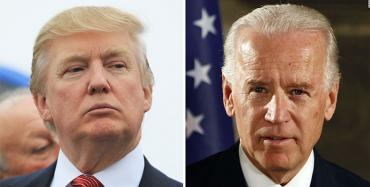
Former Vice President Joe Biden remains on top of the crowded Democratic primary field, according to a new poll.
On Wednesday morning, Quinnipiac University released a poll of Democratic voters and Democratic leaning independents which shows Biden out front with 32 percent. U.S. Sen. Elizabeth Warren, D-Mass., stands in second with 19 percent followed by U.S. Sen. Bernie Sanders, I-Vt., with 15 percent.
The rest of the field stands in single digits. U.S. Sen. Kamala Harris, D-Calif., pulls 7 percent followed by South Bend Mayor Pete Buttigieg with 5 percent and businessman Andrew Yang with 3 percent.
With some of the dark horse candidates trying to score well in the polls to make the stage for the third debate, the Quinnipiac poll offers them little hope as the rest of the pack stands at 1 percent or below.
U.S. Sen. Mike Bennet, D-Col., U.S. Sen. Cory Booker, D-NJ, Gov. Steve Bullock, D-Mont., New York City Mayor Bill de Blasio, U.S. Rep. Tulsi Gabbard, D-Hi., U.S. Sen. Amy Klobuchar, D-Minn., and writer Marianne Williamson all take 1 percent apiece. Former U.S. HHS Sec. Julian Castro, U.S. Sen. Kirsten Gillibrand, D-NY, Miramar Mayor Wayne Messam, U.S. Rep. Tim Ryan, D-Ohio, former U.S. Rep. Joe Sestak, D-Penn., billionaire and activist Tom Steyer all take less than one-half of 1 percent.
Bringing in registered voters from all parties, the poll shows the top Democratic candidates ahead of President Donald Trump. Biden is ahead 54 percent to 38 percent. Sanders takes 53 percent while Trump gets 39 percent in that matchup. Warren pulls 52 percent when pitted against Trump who gets 40 percent. Harris takes 51 percent while Trump gets 40 percent. Buttigieg gets 49 percent while Trump takes 40 percent in that matchup.
“Looking at all of the matchups, President Trump is stuck between 38 and 40 percent of the vote. These low numbers may partly be explained by a lack of support among white women, a key voting bloc that voted for Trump in the 2016 election. Today, white women go for the Democratic candidate by double digits in every scenario. Though it is a long 14 months until Election Day, Trump's vulnerability among this important voting group does not bode well for him,” the pollster noted.
"In hypothetical matchups between President Trump and the top five Democratic presidential candidates, one key number is 40," said Quinnipiac University Polling Analyst Mary Snow. "It's the ceiling of support for Trump, no matter the candidate. It hovers close to his job approval rating, which has stayed in a tight range since being elected."
A majority of those surveyed--56 percent--disapprove of Trump while 38 percent approve of him as voters grow increasingly worried about the economy.
“For the first time since President Trump was elected, more voters say that the national economy is getting worse than getting better, with 37 percent saying it is getting worse, 31 percent saying it is getting better, and 30 percent saying it is staying the same. This compares to a June 11, 2019 poll in which 23 percent of voters said that the national economy is getting worse, 39 percent said it is getting better, and 37 percent said it is staying the same,” the pollster noted.
Despite that, a clear majority of those surveyed--61 percent--say the economy is excellent or good while only 37 percent think it’s not so good or poor.
“ These numbers, while still clearly positive on the economy, are the lowest excellent/good economy numbers found by the Quinnipiac University Poll since April 2018. Voters also say that President Trump's policies are hurting the nation's economy at 41 percent, while 37 percent say that they are helping, and 20 percent say that his policies make no difference,” the pollster noted.
Snow offered her take on what the poll revealed about what Americans think about the economy.
"As trade tensions with China dominate the headlines, confidence in the economy is slipping," Snow said. "The number of people who think the economy is getting worse rose by double digits since June. And roughly 4 in 10 voters blame the president's policies, saying they are hurting the economy, the highest level since Trump took office."
Trump’s handing of the economy has the approval of 46 percent of those surveyed while 49 percent disapprove of it but he gets lower marks on other areas including: 38 - 56 percent approval for his handling of foreign policy; 38 - 59 percent approval for his handling of immigration issues; 38 - 54 percent approval for his handling of trade; 38 - 53 percent approval for his handling of gun policy; 32 - 62 percent approval for his handling of race relations. Asked if Trump is doing more to divide or unite the country, 30 percent say united and 62 percent say divide.
The poll of 1,422 registered voters across the nation was taken from Aug. 21 through Aug. 26 and had a margin of error of +/- 3.1 percent. The poll included a survey of 648 Democratic voters and independent voters who lean Democratic with a margin of error of +/- 4.6 percent.


